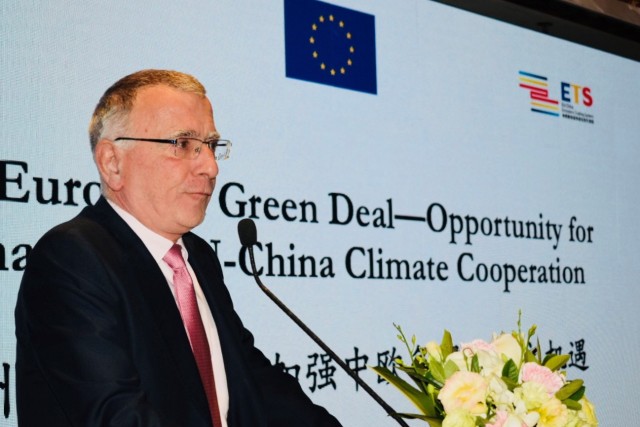
Becoming climate-neutral is one of the greatest challenges and opportunity of our times. On 11 December 2019, the European Commission presented the European Green Deal–a roadmap for making the EU's economy sustainable by turning climate and environmental challenges into opportunities across all policy areas and making the transition just and inclusive for all.
It provides actions to boost the efficient use of resources by moving to a clean, circular economy and stop climate change, revert biodiversity loss and cut pollution. It outlines investments needed and financing tools available and explains how to ensure a just and inclusive transition. It covers all sectors of the economy, notably transport, energy, agriculture, buildings and industries.
|
|
|
|
Co-hosted by the Delegation of the European Union to China (EUD) and Energy Foundation (EF), a public event was hosted in Beijing on 13 January 2020 to present and elaborate on the European Green Deal and explore the opportunities to enhance EU-China collaboration. It also addresses the common challenges facing the European Green Deal and China's 14 Five-Year Plan and mid-century strategy.
Opening remarks was jointly addressed by H.E. Ambassador Nicolas CHAPUIS, Head of Delegation, Delegation of the European Union to China, and Mr. REN Shuben, Director General, Department of Resource Conservation and Environmental Protection, Department of National Development and Reform Commission.
A keynote speech The European Green Deal-accelerating the shift to sustainable and smart mobility was delivered by Mr. Artur RUNGE-METZGER, Director for Climate Strategy, Governance and Emissions from Non-trading Sectors, Directorate General for Climate Action, European Commission. In the following, Mr. ZOU Ji, President and CEO, Energy Foundation Beijing Office gave the speech on Climate cooperation as a stronger driver for EU-China strategic relations.
This event represents a versatile form of communication with more than 150 participants. Policy makers will benefit from effective communication with the key groups to keep up advanced climate change governance, including ETS and carbon pricing with the market developments.